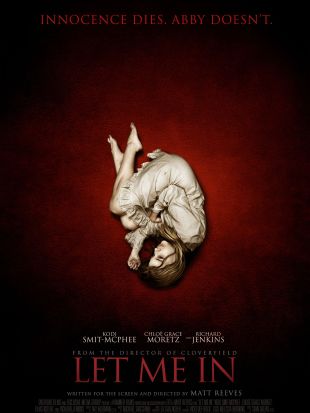
More a remake of Tomas Alfredson's critically acclaimed Let the Right One In than a reinterpretation of the imposing and complex novel that inspired it, screenwriter/director Matt Reeves' Let Me In nevertheless endures the scrutiny of comparison. It takes a particularly brave director to tackle a remake of the horror film some critics called the decade's best -- especially when it's been less than two years since its release -- but while fanboys and casual critics wasted no time in speculating how the story would be dumbed down and neutered for mass consumption, Reeves, for the most part, delivers a film that's every bit as compelling as Alfredson's original.
The sensitive target of vicious bullying at school, 12-year-old Owen (Kodi Smit-McPhee) is a social misfit from a broken home. By day Owen dreams about laying waste to his classroom tormentors; by night his attentions turn to his reclusive neighbors in their austere apartment complex. One evening, as Owen takes out his pent-up aggressions on a tree, his new neighbor Abby (Chloë Grace Moretz) appears over his shoulder. A young girl wise beyond her years, Abby just moved in next door to Owen with her stoic caretaker (Richard Jenkins), who seems to harbor a sinister secret. Compelled by Abby's apparent imperviousness to the harsh winter elements, her frail disposition, and the fact that she's nowhere to be found before the sun falls, Owen senses a kindred soul, and strikes up a friendship with the girl, despite her repeated attempts to maintain an emotional distance. Simultaneously, their community grows vigilant following a series of vicious murders, and Abby's caretaker vanishes without a trace. Later, as Abby begins to grow vulnerable, her bond with Owen strengthens. By the time Owen begins to suspect that his evasive new friend is something other than human, it starts to seem as if Abby could use a good friend after all. Given that his bullies are growing more emboldened by the day, so too could Owen.
It's no secret that horror fans tend to get a bit grumpy when hotshot young directors start tinkering with their favorite films. Given the international success enjoyed by Alfredson's film (not to mention the fact that it featured a screenplay penned by the source novel's author), in this particular case their incredulity seemed somewhat justified; after all, if John Ajvide Lindqvist has already adapted his own novel for the screen, in its original language, it might seem as if the definitive version of the story had already been told. But even if Lindqvist's script were without flaw, and every other aspect of the production were perfectly executed, the fact remains that viewers outside of Sweden are bound to overlook some of the many cultural and linguistic nuances that made it so successful to native viewers -- regardless of the universal themes that it touches upon. Enter Reeves, a writer with a firm grasp on the themes of alienation and vulnerability that drive the story, and a filmmaker who possesses the skill to explore them, with a similar attention to detail, in English. By contrast, Reeves distinguishes his take on the material by making Abby notably more ferocious than her Swedish counterpart, and while that approach can suffer in CG-augmented sequences, in close-up shots it's startlingly effective.
Film is a collaborative medium, though, so to succeed at that task requires the efforts of a great many people, all of whom prove they are up to the challenge here. Pensive and pasty as Owen, Smit-McPhee follows his devastating performance in John Hillcoat's The Road with one that's arguably at least as tragic, but registers as even more potent given his ability to clearly communicate the fears of his emotionally fragile character. Watching Owen struggle to summon the courage needed to lash back at his bullies is just as satisfying here as it was in Alfredson's film, and seeing his reaction to being brushed off by his absentee father proves that young Smit-McPhee is no fluke. His performance is complimented perfectly by Moretz, who is alternately fascinating and horrifying in a role that doesn't whitewash Abby's monstrous true nature. Though some may argue that Reeves has compromised the material due to the noticeable omission of one particularly controversial shot from Let the Right One In, others could make a case that the image was superfluous anyway due to Abby's line of dialogue "I'm not a girl"; opening that particular can of worms could be more damaging to the story than beneficial if the filmmakers didn't fully commit to exploring it. Supporting performances are strong all around, with Dylan Minnette conveying true adolescent menace as the bully unwilling to be one-upped, and Jenkins is serviceable, if a little underused, as Abby's foreboding guardian.

In terms of atmosphere, composer Michael Giacchino delivers a score that places heavy emphasis on the gradual twisting of an innocent childhood friendship into something worthy of genuine dread. And cinematographer Greig Fraser gives Let Me In a chilly air of isolated despair that never lets up -- no big surprise given that the film's visual palette bears more than a passing resemblance to that of its steel-hued older twin.
It may seem contradictory to claim that Let Me In is as hauntingly ethereal as Let the Right One In while at the same time being slightly more gruesome, but that's also what makes it a successful and distinguished variation. A solid comeback for Hammer Films and proof positive that Reeves can do more than chase a CG monster around New York City with a video camera, Let Me In is that rare, sturdy remake that doesn't crumble under comparison, and hints at an emerging directorial talent with much more capability than many gave him credit for.
